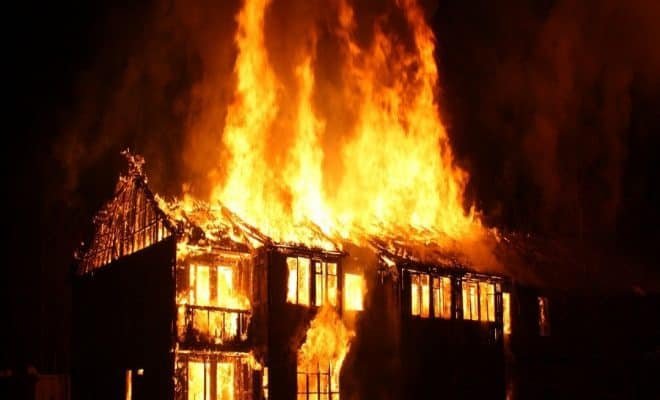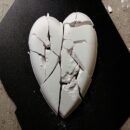Ularma’s Rings

Of course, it produced no change in temperature, but when the dust from the ring system pelted Ularma’s Orbital Station, it sounded like a massive thunderstorm and made Corry long to curl up in a warm blanket. The sand formed tiny rivulets on the domed window that comprised the ceiling and upper wall, working in aggregate to cloud the view. Normally the untouched majesty of space showed through as he trod the worn sidewalk between the dormitories and the research station, but he couldn’t help but look up into the swirling storm, anyway. Work would be a slog today.
The imposing metal door on the looming, lopsided structure at the end of the path accepted his key-card and granted him entry. He strode to his workstation, slid into his chair, and activated the computers with an automatic motion. Once Corry finished logging in, he stopped and noticed the large lab was nearly empty.
Sara wandered over to Corry’s desk, carrying two coffees. Last week, during lunch break, they learned they shared a love of Isaac Asimov novels. She greeted him with a subdued, “Good morning,” and extended a cup in his direction.
He took the warm mug, smiling into her green eyes through the steam. “Enjoy your evening, Sara?”
“I stayed up late watching the full moons,” she confessed. “Did you see the alignment?”
To the best of his knowledge, everyone had been out gazing at the confluence of Septa, Ventax, Armia, Nova, and Pris, the five largest moons of Ularma, the gas giant they orbited. The display was nothing short of amazing; the sky was clear of debris and dark as the depths of space with light from the sun shining on the planet’s far side. Septa hung massive and golden overhead. Its transit was so close to the wide belt of rings that the shapes of the clouds in its atmosphere were almost visible. Pink Ventax loomed over its shoulder, with bone-white Armia and the rest lining up behind. One by one, they slipped out of sight, gobbled up by the globe in front of them. Distant Pris disappeared first, but once they started winking out, they appeared to compress into a single satellite within half an hour.
“Yeah, it was lovely,” he replied.
She put her hand on her hip, drawing attention to her figure. “I suppose it might not seem so spectacular after everywhere you’ve been.”
Corry chuckled into his coffee, embarrassed that his reputation came up again. It was true; he had flown more missions than his cohorts, and he was the only one in the group to attempt the Gliese 282 Split, where the pilot used the pull of the red dwarf to propel themselves through the gap between the K-stars. Still, he preferred the notoriety of a scientist, equal to the others. His colleagues deduced that his exposure to the grandeur of one part of the universe dulled his sense of wonder for another. But he found a bit of proffered idolatry from Sara tempting.
“I assure you, I recognize beauty when I see it.” He blew into his cup to distract himself before he said something awkward. “Were you impressed?”
“Oh, yes!” She bobbed as she spoke, and the chestnut curls that framed her face accentuated those pretty movements. “But I’ve never been farther away than Draconis.”
He nodded wisely. “You’ve seen plenty of the cosmos to understand.”
By then, their coworkers filtered in, and the surrounding workstations filled up. The roar from outside buzzed overhead. In the opposite corner, they noticed that the lead tech, Dr. Grayson, had arrived. Corry saw his neighbor headed over from the coffee kiosk.
He sighed. “And, in sharp contrast, there are days like today.”
“It was hard to get out of bed this morning,” she agreed.
“How many people do you think will call off because of the weather?” he joked.
As she laughed, the sound of the storm lessened, and when she stopped, the noise of the ring-dust had vanished.
The room got quiet as the team of scientists listened to the abrupt pause. Dust showers rose and fell gradually; they didn’t cut out during violent deluges.
After a full minute of dead silence, Dr. Grayson bellowed, “Everyone, to your desks and get busy! Figure out what the hell happened!”
With a quick wave, Sara was gone. Corry dove into his seat and tapped keys maniacally. Nothing the screen showed made sense.
An alarm blared across the lab. Underneath it, someone stood from a computer and yelled, “It’s our position! Something pulled us out of the rings!” Once Corry had the missing piece of the puzzle, everything fell into place. Their movement explained all the gravimetric and stellar data.
Cries of concurrence rang out. Everyone’s calculations seemed to be in agreement. But they struggled to find an explanation.
Sara had the epiphany. “It’s the moons! With the others lined up behind it, Septa’s gravity is so strong it knocked us out of orbit!”
“God damn it,” Corry swore under his breath as all the eyes fell on him. Deep under the belly of the Orbital Station rested the thrusters that maneuvered the contraption into place, rusting from disuse. A specialist who was long gone had guided them into Ularma’s rings; Corry himself hadn’t even been on board. But as the most experienced pilot remaining, he understood what the situation demanded of him.
Finally, Dr. Grayson asked, “Is there any chance to fix this?”
Corry looked over his figures. With dozens of minor adjustments in their trajectory, he should be able to put them on the correct course without causing too much stress on the outer hull. However, a misstep could cause a breach. He answered, “It looks possible, but I’m not sure I can do it. This thing handles differently than a spaceship.”
Dr. Grayson’s steely conviction sent shivers down his spine. “You’re our best hope. Look at the numbers. Septa’s gravity well will be insurmountable before anyone else reaches us.”
The math stared Corry in the face. He knew it was true. Septa orbited too close to the rings, and they careened straight toward it. If they didn’t stabilize their position in time, it would exert more pull on the station than their feeble propulsion system could compensate for.
“I have to try,” Corry replied, his quiet voice carrying across the room.
***
For an hour, they checked and rechecked the numbers. Everyone agreed on the calculations, but even that felt insufficient, given the task’s magnitude. Deep in the pit of his stomach, Corry knew that if the plan failed, his execution would be to blame, not arithmetic.
Then he could delay climbing into the pilot’s nest no longer. Reaching the controls required plunging into the guts of the floating city. George, an older mechanic, came to show him the way. Labyrinthine corridors led them past the inner workings of the artificial gravity, only to bring them to four levels of waste reclamation they had to descend through via ladders. At last, George brought him to a heavy metal door.
“Here you are. Good luck,” he said, and was gone.
The cockpit hung below the lowest decks and offered a three-hundred-and-sixty-degree view. Corry could see the thin layer of rocks and debris that formed the ring disk they’d slid out of, as well as the thick clouds of the moon they drifted toward. The godlike emptiness between the two shocked him into stillness until Dr. Grayson’s voice came over the radio.
“Corry? Come in. Are you there yet?”
He snagged the headset lying on the console. “I’m here.” He activated the control panels while climbing into the bucket seat. The instruments buzzed to life.
“Alright, everybody’s ready. You know what to do.”
“Ok, here we go.” Corry oriented them at the ring’s narrow cross-section and triggered the thrusters for three seconds. The throttle kicked back stronger than he expected and they almost ended up pointed at Ularma’s north pole.
“Good, we’re moving,” Dr. Grayson declared. “But not fast enough. Twenty-thousand kph when we should be doing thirty at this point.”
“Let me make the round of changes we planned and I’ll try to compensate,” Corry promised. He keyed his coordinates into the dashboards and made the adjustments the computer suggested. When he finished, he double-checked his math about the next burn until he was confident in his decision. A minute and a half of wait time passed.
He opened the com line. “Ready for another burst.”
“Go ahead,” Dr. Grayson acknowledged.
Corry burned the thrusters for four seconds. The station shuddered as he was closing them. He bit his lip, wondering if he’d damaged the infrastructure, which was designed to orbit, not fly through space. He waited for the alarms that he had caused a breach, but the movement stopped when he killed the acceleration.
“How fast are we going now?” he asked when the alarms stayed quiet.
“That did it!” Dr. Grayson cheered. “We’re up to our projected speed.”
“That was easy. I guess my job is done,” Corry joked as he handled the minutia of steering. The awkwardly shaped space station wasn’t maneuverable; what flight corrections he could make needed to be planned.
“We all know you’ve got this,” Dr. Grayson told him.
Corry wished he had some of that confidence. The controls continued to squirm away from his guidance.
He entered the ring-disk near the middle of its hundred-kilometer thickness and aimed to keep his pitch attenuated so that he remained in that zone of the band. He hit the brakes. Thrusters on the other side fired in half second bursts, separated by five-second intervals. The station lurched, but the foundations didn’t shake again. After a dozen cycles, they came to a stop.
“How’s that?” he asked Dr. Grayson.
“Reading all stopped, right where we intended to be,” he informed him. “Our new position is closer to Ularma, so we shouldn’t get caught in another game of tug-of-war.”
Corry wound his way out of the station’s innards. Half-way through the gravity generator, he heard the pitter-patter of the particles raining down on top of the dome outside. He heaved a sigh of relief. The comforting noise confirmed that the mission had been successful.
A cheer broke out when Corry walked into the lab. Everyone applauded while he blushed and waved them off. He returned to his desk in the corner, but the atmosphere was too boisterous; no one intended to return to work.
His neighbor, Tom, congratulated him. From the spot behind him, Pam came by and gave him a high-five.
Sara sauntered over, wearing a wide smile. “You really saved the day!” her cheeks flushed with emotion.
“I did what I could and nothing went wrong,” he demurred.
The dust outside intensified, and they both grinned at the implications. “I never thought I’d be so thankful to hear that sound,” she said.
“It gives me a newfound appreciation for this weather,” he agreed. His gaze darted to the floor before coming to rest on her face. “It’s actually pretty romantic.” He dared to take one of her hands in his. “Would you like to go out and enjoy it with me tonight?”
“I’d love to!” With that, she lifted herself up on her tiptoes and reached for the back of his head, drawing him down for a kiss.
Editor: Michelle Naragon








